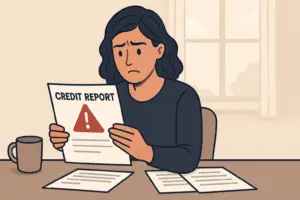Some people might feel like they’re dreaming when they see a hefty sum of money suddenly appear in their bank account. Unfortunately, if they don’t know where the funds came from, this dream can change quickly into a nightmare. The team at Schlanger Law Group recently filed a lawsuit against Citibank to resolve a serious violation of the Electronic Funds Transfer Act (EFTA) that started with a mysterious deposit into our client’s Citi account.
How the EFTA Nightmare Began
In February 2021 our client, we’ll call her Betty, realized her Citi account had received three mobile deposits in the total amount of $74,500. Betty didn’t make these mobile transfers. Also, right after the deposits, $19,999 was electronically withdrawn from her account. Betty didn’t request the withdrawal either. A fraudster had gained access to Betty’s account and she became a victim of identity theft.
Betty contacted Citi the following day to dispute the transactions. She asked Citi to freeze her account and a Citi representative told Betty to go to a local Citi branch to close the account and open a new one. Betty did what she was told.
Meanwhile, the fraudster’s $74,500 deposits did not clear the bank and were returned for insufficient funds after the $19,999 withdrawal was taken from Betty’s account. After Betty froze her account, the fraudsters tried to make another deposit which Citi rejected but then Citi allowed a second withdrawal of $10,000.
To make matters worse, after Citi closed the first account and transferred Betty’s money to the new account it performed a fraud investigation. As a result, Citi closed the new account and took Betty’s money because Citi claimed the new account had been funded by “bad money.”
What Should an Account Holder Do in This Situation?
Many consumers learn the hard way that even if you act quickly and do everything suggested by the law, you may not be able to resolve a fraudulent transfer situation on your own. Our client did everything possible to notify the authorities about the fraud and recover her funds. Specifically, as soon as she found the problem, Betty jumped into action and:
- Contacted Citi within 24 hours of realizing the fraud,
- Filed a local police report,
- Filed an FBI complaint,
- Completed an identity theft report with the Federal Trade Commission,
- Prepared a consumer complaint with the New York Department of Financial Services, and
- Notified the Consumer Financial Protection Bureau.
The fraudulent withdrawals were processed through Zelle and Apple Pay so Betty also disputed the activity with these businesses. However, her efforts did not pay off. Citi rejected her dispute and refused to return Betty’s funds.
What Was Citi Required to do Under the EFTA?
When an account holder disputes a fraudulent electronic transfer, the financial institution must take certain steps under the Electronic Funds Transfer Act. In general, the bank is prohibited from holding the consumer liable for unauthorized charges. Moreover, the bank must investigate the circumstances, issue a provisional credit of the disputed funds back to the account, report the investigation outcome, and supply proof of how it reached a final decision.
Certain time frames apply to both the account holder and the bank, mostly to protect the account holder’s rights and money. Depending on when the consumer notifies the bank about the fraud, the bank is also obligated to limit the account holder’s losses. In our case, since Betty let Citi know within 24 hours, her total loss should have been capped at no more than $50.
What Did Citi Actually Do?
After receiving Betty’s call, Citi agreed to freeze her account and told her to close that account and open a new one. Citi also issued a temporary credit for some of the money taken while it investigated the claim. However, Citi eventually denied Betty’s dispute because Citi claimed:
- The original mobile deposits were done with an established Face ID Entry Device,
- Betty had made transfers through Zelle in the past, and
- The withdrawal that was made on the same day as the large deposit was not disputed by Betty.
During its investigation, Citi should have found that Betty’s account history showed no large deposits in the past, and Citi should have recognized the fraudulent scheme where large check deposits are made with quick withdrawals before the checks have time to clear. Betty appealed Citi’s decision, but her appeal was rejected as well.
How is Schlanger Law Group Helping?
On November 11, 2021, our managing partner, Dan Schlanger, filed a lawsuit in federal court to protect Betty’s rights and hold Citibank accountable. According to the EFTA, Citi is responsible for unauthorized transfers from its customers’ accounts. Citi has failed to live up to its responsibilities and did not credit the stolen funds back to Betty.
Citi must also perform a reasonable investigation into fraud claims, but Citi did not reasonably investigate Betty’s case and wrongfully decided that she allowed the fraudulent transfers. On behalf of Betty, we are asking the court to hold Citibank responsible for Betty’s actual losses, statutory damages, attorney’s fees, and costs. Also, because Citi didn’t do a reasonable investigation and had no basis for rejecting Betty’s fraud claim, we hope to recover treble damages (three times Betty’s losses) and punitive damages to punish Citi for the way it treats customers.
Don’t Face Your EFTA Nightmare Alone
Stories like Betty’s are becoming more common every day. Big banks don’t always take the necessary precautions to protect innocent fraud victims and often try to avoid their legal responsibilities. The team at Schlanger Law Group is passionate about protecting consumers from these EFTA nightmare situations. If you, or someone you know, is in a similar situation, contact our responsive consumer fraud attorneys for a free case consultation. Call (212) 500-6114 or complete our simple online form today.







